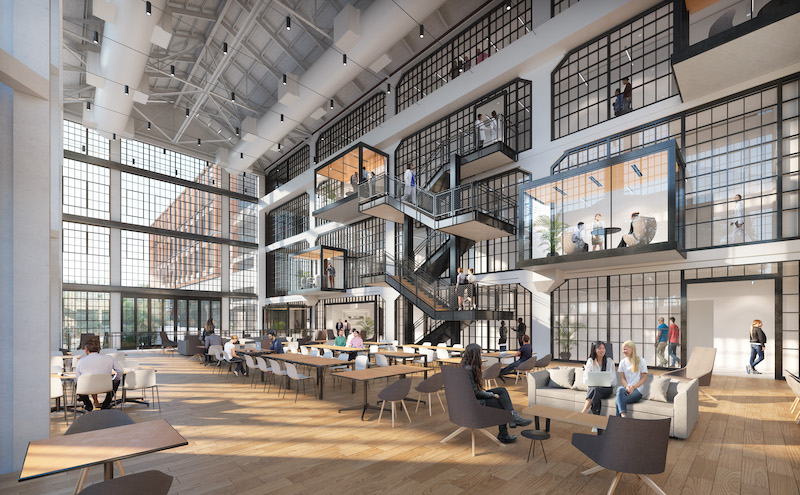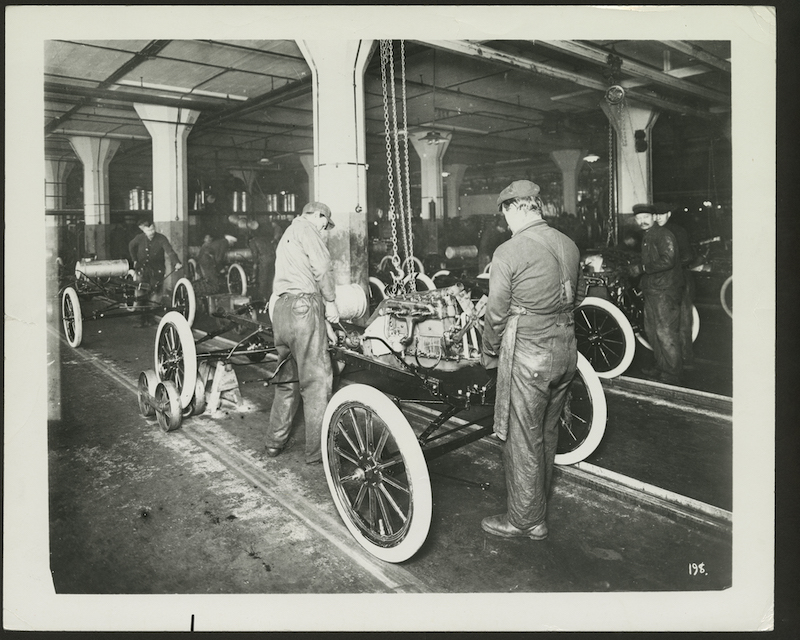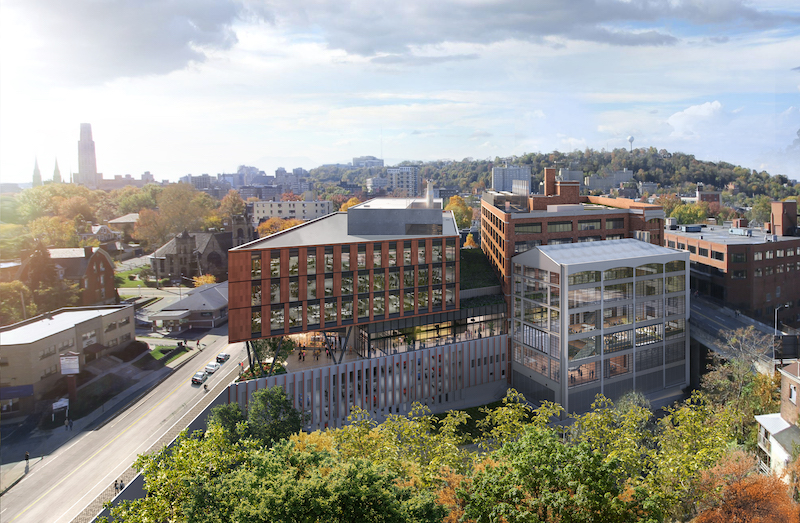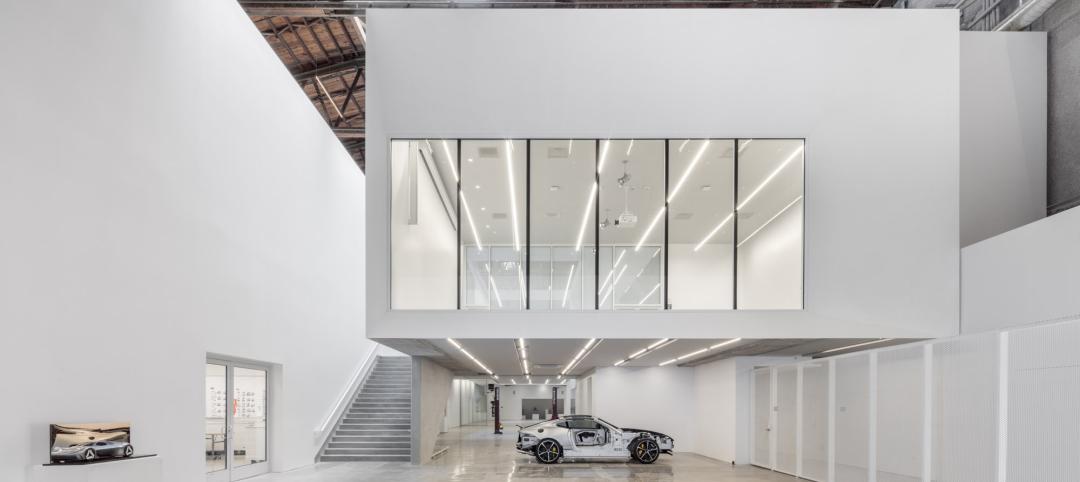A former Ford Motor Company assembly plant in Pittsburgh, which was built in 1915 as a factory and showroom for Model Ts, is being transformed into a research, innovation, and entrepreneurship hub called The Assembly.
A team led by Wexford Science & Technology and the University of Pittsburgh is adding 105,000 sf to the plant’s original 250,000 sf. The enlarged building will house labs and office spaces, an in-building parking garage with a secured bike room and showers; gathering, event, and conference spaces; a 250-seat auditorium, and a restaurant and café.

The Assembly will provide ample space for gatherings and events. The stairwell access to each floor is one of Wexford's design signatures.
The Assembly, which is scheduled to open early next year, will be the future home to the university’s researchers who are focused on discoveries related to cancer biology and other areas. The final beam for this project was secured on May 25, an event that was applauded by over 300 construction workers on site.
Also see: Pittsburgh’s Neighborhood 91 for additive manufacturing
ANOTHER INNOVATION CORNERSTONE

Ford Motor Company made Model Ts in this plant for more that 30 years.
Wexford’s website states that this adaptive reuse and renovation will create a 345,000-sf, three-story facility with 36,000-sf floor plates with 14-ft 6-inch floor-to-floor heights, and 108,000 sf of rentable space. The Assembly is located in Pittsburgh’s Baum-Centre corridor, a mass-transit oriented urban district designed to serve businesses.
Also see: Pittsburgh combats construction fraud
“These state-of-the-art labs, dramatic convening spaces, and top-tier researchers will attract the talent, ideas, and companies that will continue to propel life science innovation in Pittsburgh,” says John Grady, Wexford’s Northeast Region Executive and Senior VP of Development.
ZGF Architects designed the renovation. Turner Construction, Ventas Inc., and Bank of America are Wexford’s other partners on this project, which rivals in scale the Mill 19 redevelopment at Hazelwood Green.
“The Assembly is a cornerstone of the Pittsburgh Innovation District,” says Sean Luther, Executive Director of InnovatePGH, a public-private partnership that supports innovation growth in Pittsburgh. “Fully leveraging Pittsburgh’s life science assets requires exactly the intentionally designed, multi-tenant facilities developed by Wexford. The Assembly represents the full vision and potential of the Pittsburgh Innovation District to translate academic research into economic development that benefits all of Western Pennsylvania.”
This $330 million redevelopment project broke ground in the summer of 2019. The year before, the building was added to the National Register of Historic Places. Ford made and sold cars out of this eight-story plant for more than 30 years.
Related Stories
Education Facilities | Aug 4, 2024
A former supersonic wind tunnel becomes a new educational facility for transportation design
The Mullin Transportation Design Center at ArtCenter College of Design in Pasadena, Calif., provides access for full-scale vehicular models, replicating a professional design studio.
Adaptive Reuse | Jul 30, 2024
Empty mall to be converted to UCLA Research Park
UCLA recently acquired a former mall that it will convert into the UCLA Research Park that will house the California Institute for Immunology and Immunotherapy at UCLA and the UCLA Center for Quantum Science and Engineering, as well as programs across other disciplines. The 700,000-sf property, formerly the Westside Pavilion shopping mall, is two miles from the university’s main Westwood campus. Google, which previously leased part of the property, helped enable and support UCLA’s acquisition.
Great Solutions | Jul 23, 2024
41 Great Solutions for architects, engineers, and contractors
AI ChatBots, ambient computing, floating MRIs, low-carbon cement, sunshine on demand, next-generation top-down construction. These and 35 other innovations make up our 2024 Great Solutions Report, which highlights fresh ideas and innovations from leading architecture, engineering, and construction firms.
Adaptive Reuse | Jul 12, 2024
Detroit’s Michigan Central Station, centerpiece of innovation hub, opens
The recently opened Michigan Central Station in Detroit is the centerpiece of a 30-acre technology and cultural hub that will include development of urban transportation solutions. The six-year adaptive reuse project of the 640,000 sf historic station, created by the same architect as New York’s Grand Central Station, is the latest sign of a reinvigorating Detroit.
MFPRO+ News | Jun 24, 2024
‘Yes in God’s Backyard’ movement could create more affordable housing
The so-called “Yes in God’s Backyard” (YIGBY) movement, where houses of worship convert their properties to housing, could help alleviate the serious housing crisis affecting many communities around the country.
Multifamily Housing | Jun 14, 2024
AEC inspections are the key to financially viable office to residential adaptive reuse projects
About a year ago our industry was abuzz with an idea that seemed like a one-shot miracle cure for both the shockingly high rate of office vacancies and the worsening housing shortage. The seemingly simple idea of converting empty office buildings to multifamily residential seemed like an easy and elegant solution. However, in the intervening months we’ve seen only a handful of these conversions, despite near universal enthusiasm for the concept.
Adaptive Reuse | Jun 13, 2024
4 ways to transform old buildings into modern assets
As cities grow, their office inventories remain largely stagnant. Yet despite changes to the market—including the impact of hybrid work—opportunities still exist. Enter: “Midlife Metamorphosis.”
Adaptive Reuse | Jun 6, 2024
Latest phase of London redevelopment completes two new buildings
Developers are creating a neighborhood for 25,000 residents and workers.
MFPRO+ News | Jun 3, 2024
New York’s office to residential conversion program draws interest from 64 owners
New York City’s Office Conversion Accelerator Program has been contacted by the owners of 64 commercial buildings interested in converting their properties to residential use.
Adaptive Reuse | May 15, 2024
Modular adaptive reuse of parking structure grants future flexibility
The shift away from excessive parking requirements aligns with a broader movement, encouraging development of more sustainable and affordable housing.

















